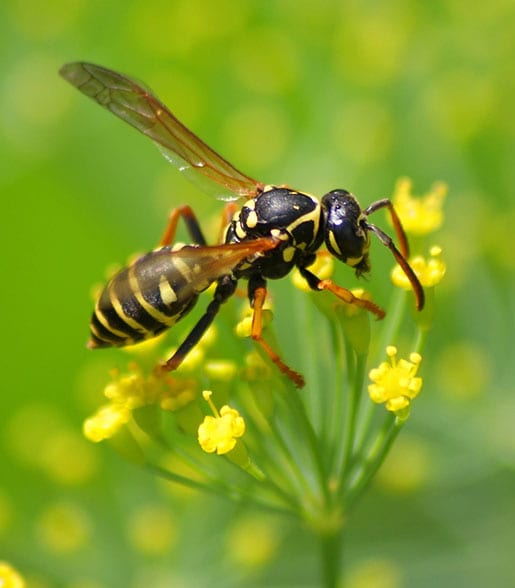Wasp Nest Removal
Wasp nest removal may be the last thing on your mind if you’re busy at work, at your home, and you definitely do not have time to deal with wasps.
You might even be tempted to ignore the problem with the hopes that it will all just magically go away on its own.
But continue reading below to learn all the reasons why that’s probably not such a good idea.


Why Wasps Are So Dangerous
Do you know why wasps can be worse than honey bees? Honey bees can only sting once, but wasps don’t have that same attribute and can sting you again and again. They are also easily provoked, even by accident. If you hit or smash a wasp, pheromones are released that will alert other wasps to attack you. Wasps are very aggressive when defending their colony and are more likely to attack when you are within 7-8 yards of their nest.
Wasps Can Cause Structural Damage
Wasp nests or hives can cause structural damage when they are built inside of your home. When lying on drywall, the nests or hives can cause the drywall to disintegrate. As the drywall disintegrates, more and more wasps will come into the structure leading to a dangerous situation.
Signs To Look For
Here are some signs your home may have been invaded by a wasp colony and are in need of wasp nest removal:
Best Time to Get Rid of a Wasp Nest
Any time that a wasp nest becomes a nuisance or a threat to your safety (or peace of mind) is the right time to remove the wasp’s nest. Towards the end of Summer, wasps, particularly yellow-jackets and hornets tend to become more aggressive as they are preparing their nests for winter, so stinging may become more likely even though the wasps were seemingly minding their own business earlier in the year. Late Autumn tends to be the safest time to get rid of wasp colonies because as the weather turns cooler, the queens and males mate and stay in protected areas during the winter. It may seem like you are no longer being pestered by the flying menaces, but they are actually just waiting to start the nesting cycle all over again in the spring.
Get a Free Estimate
Call us or fill out the form below for your free estimate.
Sign up to receive our latest offers
Give us your name and email and we’ll send you the latest news and offers from Classic Pest Control and Insulation.